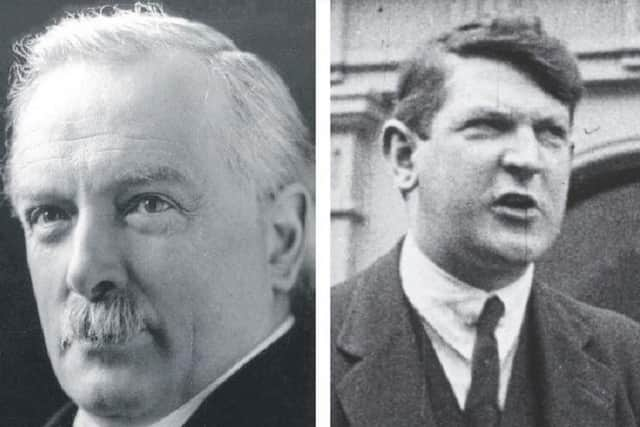Charles McGuinness: Gun-running for the IRA as treaty negotiations proceeded in London


The republican movement had ostensibly been on ceasefire since the truce of July 1921 but this had not deterred the leadership from dispatching the Derry man to Germany to procure arms for the army.
The Lower Road man was a trusted figure within the IRA who had been extremely active during the Tan War.
Advertisement
Hide AdAdvertisement
Hide AdA sailor by trade and inclination McGuinness had led a Flying Column recruited in Derry into action in Donegal in early 1921; he had, in February of that year, masterminded the escape of


Frank Carty, O/C of the Tubbercurry Battalion of the IRA from the Derry jail; and, following his own capture in the Rosses shortly before the truce, effected his own daring escape from Ebrington .
Not long after his liberation from the Derry barracks McGuinness was summoned to IRA HQ in Dublin by Michael Collins. The ‘Big Fellow’, according to McGuinness’ own account of the meeting, had asked him if he believed it would be possible to bring a load of weapons from Germany in a submarine. The Derry man thought it was a stupid idea and told Collins so.
“The idea is absurd from any seaman’s point of view. A submarine would attract more attention than a Cunarder [a liner of the famous Cunard company] or a Zeppelin,” said McGuinness.
Advertisement
Hide AdAdvertisement
Hide AdCollins had apparently agreed and told McGuinness that some others among the republican leadership had suggested the idea of a U-Boat.
Following some discussion it was decided that the mission would be more readily accomplished using a boat that ‘looks no different than a thousand others’, as McGuinness put it.
“I went on to explain a procedure that I would follow. I would go to Germany and purchase the arms, and ship them openly to a neutral country not specified in the embargo on arms, arranging to have dummy consignees.
“Then, when I got to sea, I would kill some time sailing or steaming, and at a propitious moment break through the blockade of our ports,” he later recalled in his fascinating memoir of the period ‘Nomad: Sailor of Fortune’ which was published in 1934.So McGuinness ended up in Hamburg where he met an old friend and shipping agent who owned several boats.
Advertisement
Hide AdAdvertisement
Hide AdHe purchased a ‘sturdy fishing-craft’ named the Anita using funds provided by Bob Briscoe, a republican who would one day serve as Lord Mayor of Dublin and later described McGuinness as ‘the toughest character I ever met’.
The Derry-native availed of his Hamburg friend’s network to buy a ‘fine collection of machine-guns and rifles and a large amount of ammunition’. He loaded the Anita with the help of ‘an excellent crew of German Communists, all eager for an exciting voyage’.
Disaster struck when McGuinness aroused suspicion by using a sterling note of improbably large denomination to buy beer and sausages for the crew in an Altona Gasthaus while they awaited an engine being repaired.
Advertisement
Hide AdAdvertisement
Hide AdMcGuinness suspected his indiscretion brought the Hamburg customs and police down on top of him. He was ultimately arrested and the ship and weapons seized.
“I was swiftly tried and convicted upon my own admission of guilt. The judge publicly admonished me for my attempt to embarrass the German Republic in the eyes of the Allied High Commission. His heated remarks burned my hide for the moment, until I learned the political significance of the verbal lashing. It was not intended for my ears at all.
“He fined me 2,000 marks, or about ten pounds at the rate of exchange for 1921. I could not help smiling at this penalty for a crime which is not usually treated with much leniency,” McGuinness recounted.
After he paid the fine McGuinness was escorted to the judge’s chambers where he was addressed in a ‘very different tone from that which he used from the Bench’.
Advertisement
Hide AdAdvertisement
Hide AdThe judge said his ‘scathing words...were uttered for the Press’ and for an English observer of the trial.
“‘Auf lhre nächste Reise, wünsche ich lhnen viel Glück.’ My meagre vocabulary, remembered from the German East campaign [McGuinness had fought in Africa] was sufficient to translate the fact that the judge wished me much luck on my next trip.”
This original abortive attempt to transport arms was, according to McGuinness, ‘hotly debated in the Reichstag’ but the episode did not discourage him. Amazingly, he immediately proceeded to organise a second vessel.
Advertisement
Hide AdAdvertisement
Hide Ad“Exactly ten days after paying the fine of 2,000 marks I left Hamburg on the sturdy tug Frieda, a larger craft than the Anita, and much better suited to the rigours of the North Sea and English Channel.
"My second ship was loaded with 1,500 rifles, 2,000 Luger Parabellums, and 1,700,000 rounds of ammunition. During this period, I made contact with the officers and crews of steamers running to Liverpool, Hull, Glasgow and London. We paid a bonus of five shillings for every revolver carried and delivered to the Irish agents in these ports.
"The smuggler received his pay upon the delivery of the goods, and we found this system of gun-running extremely effective, for Britain had no system to cope with it,” McGuinness remembered.
Advertisement
Hide AdAdvertisement
Hide AdThe Frieda set off in early November 1921 and cleared customs on the pretence it was bound for Rotterdam.
The voyage was ponderous due to the ‘bad temper’ of the North Sea. McGuinness was held up at Cuxhaven and again at Terschelling - one of the Frisian islands off the northern coast of the Netherlands.
“As we were carrying explosives, we were obliged to fly the red danger flag ‘B’ of the international signal code.
“This created unwelcome gossip, and we were suspected of being a Bolshevik gun-runner. Luckily the storm had blown down the radio masts, putting the island out of communication with the outside world. We were thus saved an investigation that would have been fatal to the success of our mission,” McGuinness wrote.
Advertisement
Hide AdAdvertisement
Hide AdThe weather faired and the Frieda made some progress. McGuinness managed to successfully run the guns down the middle of the English Channel with little incident.
The crew had to repaint a band on the ship’s funnel a dark red because the original was in the white of a German flag. The nameplates were also repainted ‘as Hamburg is a home port which would make our presence in English Channel bound to Rotterdam incredible’.
The Frieda eventually made its way to its intended rendezvous point off Helvick Head in An Rinn in Co. Waterford but McGuinness was decidedly unimpressed by the lack of aid from the volunteers on terra firma.
Advertisement
Hide AdAdvertisement
Hide AdAfter cruising up and down the coast and signalling in vain, he noted in his diary: “We have cruised all night, and at last, seeing we are unnoticed, determine to run gauntlet and make for Waterford River, to one of the small villages there. We are gloomy over the lack of aid from land.”
McGuinness sailed the cargo up the estuary of the Nore, Suir and Barrow right under the noses of the authorities in the Dunmore coastguard station and at Duncannon Fort.
The Frieda dropped anchor near Passage East. McGuinness recalled: “At last we were in an Irish harbour. What a reception! All night the Germans had taunted me with our failure to aid Spindler of the Aud in the Casement fiasco during the World War. This, they said, was going to be another repetition. I could hardly blame them for their scepticism.
"They did not know how unreliable we Irish are at keeping appointments. In all our maritime ventures we have been successful failures: successful in supplying a martyr, but failing to accomplish anything.” McGuinness managed to make contact with Vincent White, the Sinn Fein T.D. for Waterford.
Advertisement
Hide AdAdvertisement
Hide Ad“When he realised that a gun-runner was actually lying in the port of Waterford right under the noses of a regiment of British soldiery and two torpedo-destroyers, his enthusiasm reached a high pitch.”
The local IRA commander Jerry [possibly Fitzgerald of the Decies Brigade] linked up with McGuinness and plans were put in place to unload the Frieda’s precious cargo and safely secrete it in dumps in the Comeraghs.
McGuinness and the German crew travelled to Dublin by train. There he met two of the most respected IRA leaders of that time - men who would take opposing sides on the treaty, then under negotiation in London.
Advertisement
Hide AdAdvertisement
Hide Ad“Dick Mulcahy was the first man I met. He was delighted at seeing me alive, and was much interested in the various samples of arms I had surreptitiously brought with me from Waterford.
“Then l met my old friend Liam Mellows, the most highly esteemed member of the IRA. Liam had given me up for dead, and his joy at meeting me was unbounded. He and everyone else thought that we must surely have perished in the violent gales raging at that time.”
The mission ended with the sale of the Frieda to a ‘retired sea-captain now turned merchant’ from Cork.
“I received a check for one thousand pounds, and without a regret washed my hands of the Frieda. And so ended happily an incident which might have proved extremely awkward for the Irish envoys negotiating with Lloyd George in Downing Street.”
‘Nomad: Sailor of Fortune’ is available to purchase from merdogbooks.com. It is also available online at http://www.cmcguinness.net/
